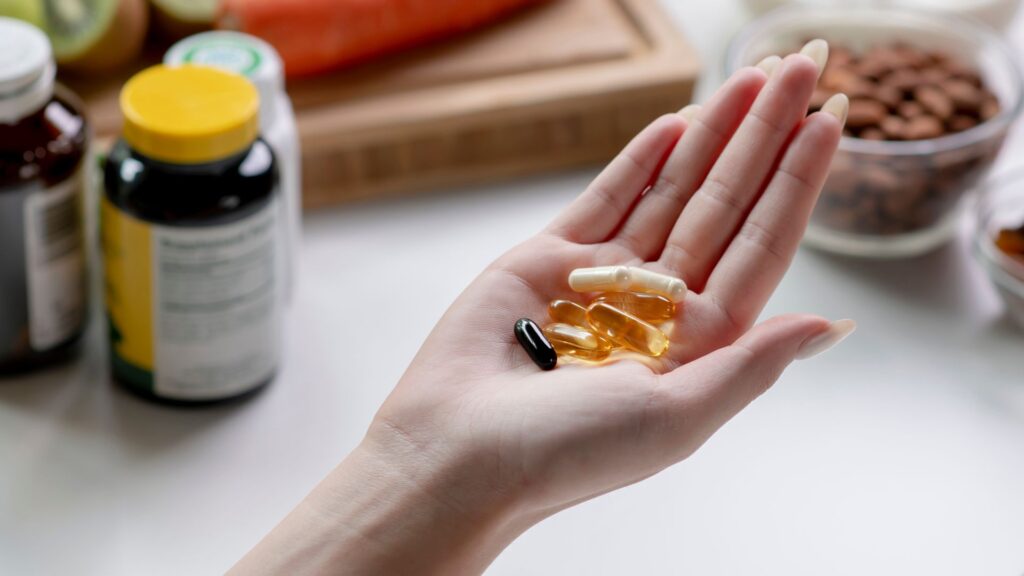Food supplements and other collagen-based products promise to improve sports performance and recovery, relieve pain or even reduce wrinkles, but are they really effective?
Powders, tablets, gummies, drinks on sale in pharmacies and online sales shops, collagen is everywhere. In Paris, a café dedicated to this substance even opened in spring 2023.
Advertisement
Suffice to say that the trend is there and that the offer abounds with, depending on your mood and your needs, the promise of rejuvenated skin, optimized muscle and joint recovery or even relief from pain in both tendons and joints. linked to osteoarthritis… From athletes to seniors to those worried about fine lines, there is something for everyone. But are collagen-based food supplements really a miracle product? We asked specialists the question and their answers were more than mixed.
Collagen is an essential component of the body
But first of all, a little clarification is necessary. In all animals – including humans – collagen is a so-called structural protein, meaning it is one of the body's building materials. A matrix, of sorts. Its particular triple helix structure is at the origin of the specific mechanical properties of the tissues where it is present: elasticity, robustness, resistance, etc.

There are different types of collagen (up to 28) which each have their own organization — and properties. Thus, type I collagen, which represents 90% of total collagen in vertebrates, constitutes the framework of bones and is also found in the skin, tendons, cornea and internal organs. Type II collagen is present in cartilage and type III collagen is found in muscles and the walls of blood vessels. If this collagen is produced massively during childhood, as we age, the body loses its ability to synthesize it, which explains in particular poorer healing abilities.
“It’s really magical thinking.”
This is where supplements based on collagen or collagen peptides would come into play. Made from connective tissues of animals such as the skin, bones and tendons of beef, pork, chicken or even fish, they provide the body with this precious collagen that it needs. A collagen which, once ingested, would itself locally repair cartilage damaged by osteoarthritis or tendons damaged during sport, redensify bones weakened by osteoporosis or restore elasticity to aging skin.
Advertisement
“It’s completely stupid from a physiological and scientific point of view”
Professor Francis Berenbaum
“ This is completely stupid from a physiological and scientific point of view », exclaims Professor Francis Berenbaum, director of an Inserm research team at the St-Antoine Research Center and head of the rheumatology department at Saint-Antoine hospital in Paris. Indeed, like all proteins we ingest, our body breaks down collagen into amino acids during digestion. These amino acids are then used by the body to produce proteins. These can contribute to the construction of collagen but also to the construction of all the other constituent proteins of our body.
So, it seems absurd to think that ingesting collagen increases the concentration of collagen in the tissues and organs that contain it or that this will increase the body's ability to produce its own collagen. “ It's truly magical thinking to believe that eating a component of healthy tissue will heal damaged tissue. “, explains the rheumatologist. A bit like eating brains so that the neurons it contains can cure a neurodegenerative disease…
Although there is no reason for collagen supplements to live up to their promises, life is full of surprises, so it is worth looking in a little more detail.
No miracle for the skin
“ It is true that as we age, there is a loss of collagen in the skin. », explains Dr Reynan Amode, dermatologist in Paris. “ But this loss of collagen is not, far from it, alone responsible for sagging skin since other factors are also at play such as a loss of bone tissue and a recession of the jaw bones. » In other words, even if the collagen in food supplements were relocated directly to the skin of the face, it would not alone combat skin aging or the “jowl effect”.


“ The scientific rationale is extremely weak and no quality study evaluating the effects of collagen on the skin presents tangible results. », Explains the dermatologist. Existing studies are often of poor methodological quality, covering very limited durations and small samples of people. “ As a dermatologist, I would much rather recommend buying a cap and sunscreen, moisturizing your skin, eating a balanced diet and exercising regularly than using collagen-based supplements. », decides the specialist.
Against osteoarthritis, no tangible proof
Concerning osteoarthritis, which consists of a breakdown of cartilage, inflammation of the membrane lining the joint and bone remodeling, Professor Berenbaum is equally dubious. “ To date, no dietary supplement has demonstrated effectiveness in rebuilding cartilage or delaying osteoarthritis. “, he insists.
“To date, no food supplement has demonstrated effectiveness in rebuilding cartilage or delaying osteoarthritis”
Professor Berenbaum
For this indication, it is often, at least according to the laboratories that market it, marine collagen which is recommended. This one is made from skin, bones or even fish cartilage. “ It is not even certain to find type 2 collagen, which constitutes cartilage. », laughs the rheumatologist, mocking the lack of knowledge of the promoters of a supplement.
He also deplores the methodological limits of the rare studies highlighting a benefit in terms of relieving pain linked to osteoarthritis: small samples, lack of randomization and/or counter-placebo, lack of medium-long term follow-up of participants, etc. “ What works to fight against osteoarthritis and prevent it is to lose weight and maintain regular physical activity, not to supplement with collagen. », specifies the specialist, admitting however that the supplements do not seem to present any risk – except for the wallet.
Pair with exercise for tendons and muscles
Concerning tendon pain, particularly in the Achilles tendon – the dread of athletes – Anthony MJ Sanchez, lecturer at UPVD and associated researcher at the University of Lausanne is a little more enthusiastic: “ There is some work which shows that supplements based on collagen peptides can contribute to a faster return to physical activity in athletes suffering from tendinopathy. »
However, he specifies that “ this only works if the supplementation is coupled with specific strengthening exercises and only when the tendinopathy is taken care of at an early stage, that is to say before the tendon presents matrix modifications and loss of vascularization “. According to him, collagen supplements could also have beneficial effects on sports pain and muscle mass gain, but always in association with physical exercise and only in middle-aged adults (not in young people, nor among seniors).
Results again from studies carried out on small samples and which deserve to be clarified and to be the subject of rigorous meta-analyses.
